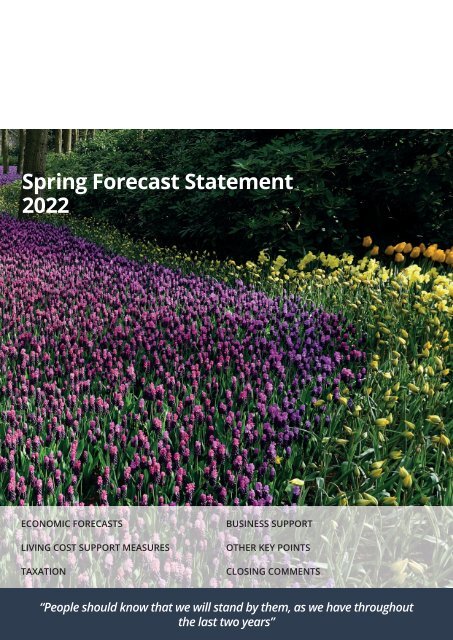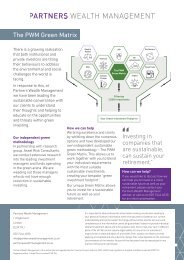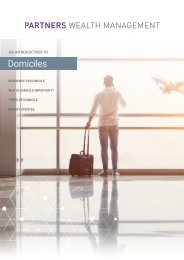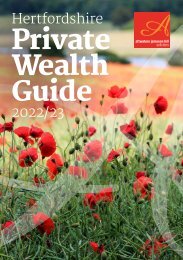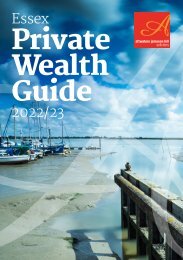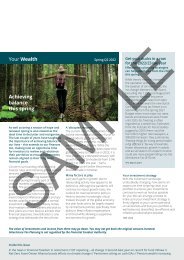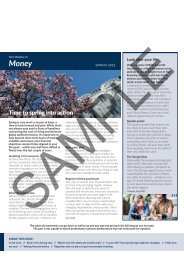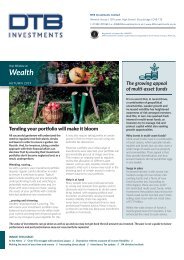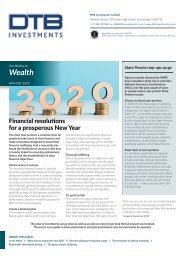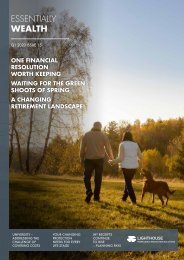14173-Spring-Forecast-Statement-2022-TOMD-v2-PR
You also want an ePaper? Increase the reach of your titles
YUMPU automatically turns print PDFs into web optimized ePapers that Google loves.
<strong>Spring</strong> <strong>Forecast</strong> <strong>Statement</strong><br />
<strong>2022</strong><br />
ECONOMIC FORECASTS<br />
LIVING COST SUPPORT MEASURES<br />
TAXATION<br />
BUSINESS SUPPORT<br />
OTHER KEY POINTS<br />
CLOSING COMMENTS<br />
“People should know that we will stand by them, as we have throughout<br />
the last two years”
<strong>Spring</strong> <strong>Forecast</strong> <strong>Statement</strong><br />
<strong>2022</strong><br />
Chancellor of the Exchequer, Rishi Sunak, delivered<br />
his <strong>2022</strong> <strong>Spring</strong> <strong>Statement</strong> on 23 March, confirming<br />
implementation of the politically contentious 1.25<br />
percentage-point rise in most National Insurance<br />
contributions, though with revised thresholds to mitigate<br />
the impact. He declared that his overall plan “builds a<br />
stronger, more secure economy for the United Kingdom.”<br />
The fiscal update included a number of specific measures<br />
and a new ‘Tax Plan’ which the Chancellor said would help<br />
families with the cost-of-living squeeze. Mr Sunak said,<br />
“People should know that we will stand by them, as we have<br />
throughout the last two years.”<br />
Economic forecasts<br />
Mr Sunak began his <strong>Statement</strong> by paying tribute to the soldiers<br />
and citizens of Ukraine, and said it was the strength of our<br />
economy that would enable the UK to help fund the Ukrainian<br />
army and impose sanctions on Putin’s regime. The Chancellor<br />
did, however, warn that actions against Russia “are not costfree<br />
for us at home” and present a “risk to our recovery” before<br />
unveiling the latest economic projections produced by the<br />
Office for Budget Responsibility (OBR).<br />
The Chancellor said the OBR had noted an “unusually high<br />
uncertainty around the outlook” as a result of Russia’s invasion,<br />
with its revised growth figures pointing to a more sluggish<br />
recovery; the UK economy is now predicted to grow by 3.8%<br />
this year and by 1.8% in 2023, both downgrades from last<br />
autumn’s forecasts of 6.0% and 2.1%, respectively. Growth is<br />
then expected to pick up in 2024, with OBR projections over<br />
the remaining three years of the forecast period stronger than<br />
last October’s predictions.<br />
Mr Sunak went on to say that the most significant impact of<br />
the war in Ukraine relates to the cost of living, with the latest<br />
OBR figures suggesting inflation will average 7.4% across the<br />
remainder of this year, and peak at 8.7% in the final quarter.<br />
This followed on from the morning’s news that UK inflation had<br />
hit a 30-year high of 6.2% in the 12 months to February.<br />
In terms of public finances, the forecasts show borrowing as<br />
a percentage of GDP falling from 83.5% in <strong>2022</strong>/23 to 79.8%<br />
by 2026/27. However, the Chancellor said that in the next<br />
financial year the UK is forecast to spend a record £83bn on<br />
debt interest, and that the OBR has warned that the UK’s ‘fiscal<br />
headroom’ could be ‘wiped out by relatively small changes to the<br />
economic outlook.’<br />
Living cost support measures<br />
During his speech, Mr Sunak outlined three specific measures<br />
that he said would help households deal with the cost-of-living<br />
crisis. These were:<br />
• Fuel duty for petrol and diesel would be cut by 5p per litre<br />
from 6pm on 23 March with the reduction lasting until<br />
March 2023<br />
• Homeowners installing energy saving measures such as<br />
solar panels, heat pumps or insulation will pay no VAT on<br />
their purchases for the next five years<br />
• The Household Support Fund will double from £500m to<br />
£1bn from April, allowing local authorities to help vulnerable<br />
families cope with rising living costs.<br />
The government have said they are continuing to monitor<br />
developments impacting the cost of living and will be ready to<br />
take further steps if needed to support households.<br />
Previous steps taken to support households include:<br />
• Reducing the Universal Credit taper rate from 63% to 55%,<br />
and increasing Universal Credit work allowances by £500 a<br />
year to make work pay<br />
• Increasing the National Living Wage (NLW) for workers aged<br />
23 and over by 6.6% to £9.50 an hour from April <strong>2022</strong><br />
• £9bn package announced in February <strong>2022</strong> to help<br />
households with rising energy bills.<br />
Taxation<br />
The Chancellor set out a three-part Tax Plan for a ‘lower tax<br />
economy’ which will cover the remainder of the Parliament. The<br />
key elements of the plan are:<br />
• The <strong>Spring</strong> <strong>Statement</strong> forms the first part of the plan –<br />
prioritising help for families with the cost of living – through<br />
the fuel duty cut (previously detailed) and an increase in<br />
National Insurance thresholds:<br />
The Chancellor announced an increase in the annual National<br />
Insurance Primary Threshold and the Lower Profits Limit from<br />
£9,880 to £12,570 from July <strong>2022</strong>, to align with the Income Tax<br />
personal allowance. This is a tax cut of over £6bn and worth<br />
over £330 for a typical employee in the year from July<br />
In addition, from April <strong>2022</strong>, self-employed individuals with<br />
profits between the Small Profits Threshold and Lower Profits<br />
Limit will continue to build up National Insurance credits but<br />
will not pay any Class 2 NICs<br />
• The second part of the plan is entitled ‘Capital, People<br />
and Ideas’ and focuses on creating the right conditions<br />
S<strong>PR</strong>ING FORECAST STATEMENT
training, as well as to close what he termed the “productivity<br />
gap” between UK businesses and those in other member<br />
countries of the Organisation for Economic Cooperation and<br />
Development (OECD). To this end, he pledged:<br />
for private sector led prosperity through growth and<br />
productivity. The government intends to work with<br />
industry over the remainder of <strong>2022</strong> and will announce its<br />
conclusions in the Autumn Budget<br />
• In a tax break worth over £5bn a year, the final part of the<br />
Tax Plan, entitled ‘Sharing Growth’, confirms a cut in the<br />
basic rate of Income Tax from 20% to 19% in England, Wales<br />
and Northern Ireland in 2024. The Scottish government will<br />
receive their share of this funding which can be used to cut<br />
taxes or increase spending.<br />
As part of the Tax Plan, the Chancellor has reaffirmed plans<br />
for tax reform to make the tax system ‘simpler, fairer and more<br />
efficient.’ This will be done by continuing the review of over<br />
1,000 tax reliefs and allowances in the tax system by 2024.<br />
Key allowances<br />
No changes were made to personal tax allowances for the<br />
forthcoming <strong>2022</strong>/23 tax year, which include:<br />
• Inheritance Tax (IHT) nil-rate band remains at £325,000 and<br />
the residence nil-rate band at £175,000, until April 2026<br />
• Capital Gains Tax (CGT) annual exemption remains at<br />
£12,300 for individuals and £6,150 for most trusts<br />
• Lifetime Allowance for pensions remains at £1,073,100 until<br />
April 2026, the Annual Allowance remains at £40,000<br />
• New single-tier State Pension will increase to £185.15<br />
per week in April <strong>2022</strong>, the older basic State Pension will<br />
increase to £141.85 per week<br />
• Individual Savings Account (ISA) allowance remains at<br />
£20,000 for the <strong>2022</strong>/23 tax year<br />
• Junior Individual Savings Account (JISA) allowance and Child<br />
Trust Fund (CTF) annual subscription limits remain at £9,000<br />
• Most National Insurance contributions (except for certain<br />
employee categories and Class 2 self-employed) and<br />
Dividend Tax rates will increase by 1.25 percentage points<br />
from April <strong>2022</strong>.<br />
Business support<br />
The Chancellor announced measures to help smaller<br />
businesses with rising energy costs, recruitment and<br />
• A £1,000 increase to the Employment Allowance, providing<br />
smaller businesses with relief of up to £5,000 on National<br />
Insurance contributions from April <strong>2022</strong><br />
• Two new business rates discounts, brought forward by<br />
a year to April <strong>2022</strong>, which will reduce rates to 0% for<br />
businesses investing in eligible green technology and<br />
heat networks.<br />
He reiterated previous measures announced in the Autumn<br />
Budget 2021:<br />
• A 50% discount (up to £110,000) on business rates for<br />
eligible retail, hospitality and leisure businesses, coming into<br />
effect in April <strong>2022</strong><br />
• An extension of the temporary £1m Annual Investment<br />
Allowance to 31 March 2023.<br />
Mr Sunak also re-emphasised the government’s commitment<br />
to reforming the research and development (R&D) tax system,<br />
as previously outlined in 2021. Measures include increasing the<br />
generosity of R&D reliefs and expanding the qualifying criteria<br />
to include data, cloud computing and pure mathematics.<br />
Furthermore, he announced that the government would be<br />
investigating how the tax system – including the operation<br />
of the Apprenticeship Levy – could be reformed to further<br />
encourage employers to invest in adult training.<br />
Other key points<br />
• The government has announced that it will phase out the<br />
import of Russian oil by the end of <strong>2022</strong><br />
• The government will be setting out an energy security plan,<br />
including measures across hydrocarbons, nuclear and<br />
renewables, to support energy resilience and security<br />
• Funding of £48.8m over three years to support the creation<br />
of a new Public Sector Fraud Authority and enhance<br />
counter-fraud work across the British Business Bank and the<br />
National Intelligence Service<br />
• A new Efficiency and Value for Money Committee will be set<br />
up to cut £5.5bn of cross-Whitehall waste, with savings to be<br />
used to fund public services<br />
• Investing £12m in HMRC to help prevent error and fraud in<br />
tax credits<br />
• NHS efficiency commitment will double from 1.1% to 2.2% a<br />
year to free up £4.75bn to fund NHS priority areas<br />
• The government is launching the second round of the<br />
Levelling Up Fund, inviting bids to come forward from all<br />
eligible organisations across the UK – this Fund provides<br />
£4.8bn for local infrastructure projects.<br />
Closing comments<br />
Rishi Sunak signed off his announcement saying, “We can<br />
deliver for the British people today and into the future. We have a<br />
plan… A plan that reforms and improves public services, a plan to<br />
grow our economy, a plan to level up across the United Kingdom, a<br />
plan that helps families with the cost of living. And yes, a tax plan…<br />
My Tax Plan delivers the biggest net cut to personal taxes in over a<br />
quarter of a century. And I commend it to the House.”<br />
MARCH <strong>2022</strong>
Make the most<br />
of your money<br />
before the end of the tax year<br />
As the end of the 2021–22 tax year approaches it’s<br />
worth ensuring you have your financial affairs in order<br />
and to double check that you’ve taken advantage of all<br />
the tax-efficient allowances available to you<br />
Make some tax-smart moves before it’s too late<br />
Get in touch to discuss any aspect<br />
of your end of tax year planning<br />
£<br />
It is important to take professional advice before making any decision relating to your personal finances. Information within this<br />
document is based on our current understanding of taxation and HMRC rules and can be subject to change in future. It does<br />
not provide individual tailored investment advice and is for guidance only. Some rules may vary in different parts of the UK;<br />
please ask for details. We cannot assume legal liability for any errors or omissions it might contain. Levels and bases of, and<br />
reliefs from taxation are those currently applying or proposed and are subject to change; their value depends on the individual<br />
circumstances of the investor.<br />
All details are correct at the time of writing (23 March <strong>2022</strong>)<br />
S<strong>PR</strong>ING FORECAST STATEMENT MARCH <strong>2022</strong>


